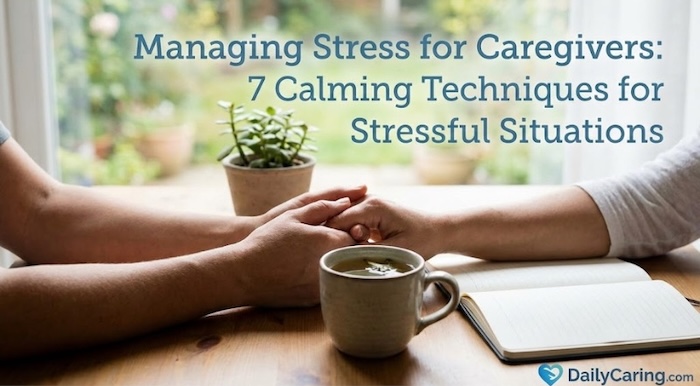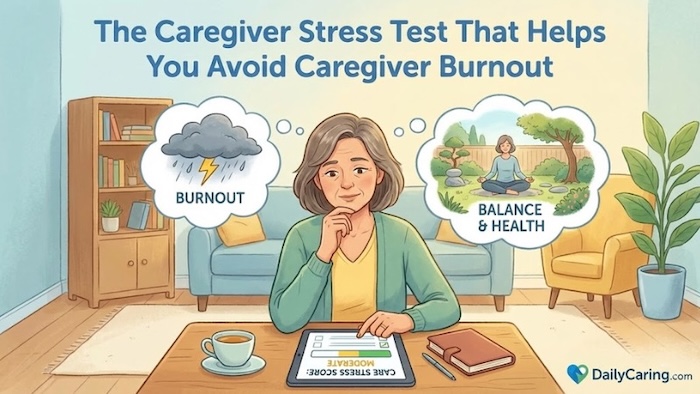If you’ve ever felt your heart race after a doctor’s appointment, lain awake replaying the day’s worries, or snapped over a small mishap, you already know caregiver anxiety isn’t just in your head, it’s in your body.
This constant, humming state of alert is more than just “stress”; it’s a physiological response to the relentless responsibility of caring for another human life. The good news is that anxiety is not a permanent fixture of caregiving. By understanding its triggers and having practical tools at your disposal, you can reclaim a sense of calm and control.

Let’s explore eight powerful ways to soothe your nervous system and restore your own well-being.
Anxiety Increases Stress and Decreases Well-Being
There’s a lot to worry about when you’re caring for an older adult. That anxiety can pump up your stress and harm your health.
To cope with caregiver anxiety and protect your health, it’s helpful to have a variety of go-to anxiety relief techniques.
Depending on the situation, you might find that some methods work better than others.
To help you reduce and manage anxiety, we found eight helpful tips in an article from Lifehack.
We share highlights from these tips and our suggestions for using them to reduce anxiety in everyday caregiving situations.
8 Ways to Relieve Caregiver Anxiety
1. Take deep calming breaths
When you’re feeling anxious, your breathing changes subconsciously.
You might take fast, shallow breaths or hold your breath.
But to start the relaxation process, your body needs the oxygen that comes from slow, deep breaths – in through your nose and out through your mouth.
When you notice that you’re anxious, deliberately start breathing slowly and deeply.
You might use a technique like square breathing, simply counting to 5 on both inhale and exhale.
Or try an app that gives you visual timing cues for slow in-and-out breaths, like Breathe2Relax (Free; iOS and Android).
2. Identify distorted thinking
When we get stressed and anxious, our brain often starts exaggerating the situation and thinking only about worst-case scenarios – no matter how unlikely they are to happen.
Of course, that thinking only increases anxiety.
To help you calm and redirect your thoughts, focus on identifying cognitive distortions.
Cognitive distortions are unhealthy thought habits that cause emotional upset, such as:
- All-or-nothing thinking, over-catastrophized thinking – “I’m totally incompetent. I’ll never do a good job as a caregiver.“
- Fortune telling – “I’ll keep making mistakes and that will cause my older adult's health to get worse.”
- Mind reading – “She thinks I’m a terrible caregiver!” or “He’s doing this on purpose because he hates me.”
- Labeling – “I’m the worst caregiver.”
- Shoulding – “I should have known not to do that, “ or “I should have known to make a different decision,” or “I should have been able to handle this.”
To change this distorted thinking, Lifehack suggests using the Triple Column Technique from Dr. David Burns' book, The New Mood Therapy.
Here’s how to do it:
- Create three columns on paper or on your computer.
- In the 1st column, write the anxiety-provoking thoughts, like “Caregiving is going to take over and I’ll have no life of my own.”
- In the 2nd column, write the type of distortion. In this example, it’s all-or-nothing thinking and fortune-telling.
- In the 3rd column, write rational and factual alternatives, like “Caregiving is taking up a lot of time right now, but I will work on ways to get more help and support so I can take time for myself too.”
3. Practice cognitive defusion
Another technique that relieves caregiver anxiety is to practice something called cognitive defusion.
This is when you “defuse” or separate thoughts from your mind. So, you’d pretend to be looking at and observing the thoughts rather than thinking those thoughts.
For example, you might say, “I’m the worst caregiver and I’ll never get any better.” Using cognitive defusion, you’d change that to “I’m having the thought again that I’m the worst caregiver.”
In the first sentence, you believe the thought. In the second sentence, you’re observing the thought.
This creates distance from your thoughts, making them less personal and powerful.
4. Be mindful and stay in the moment
Part of what causes anxiety is our judgments about and reaction to what’s happening. Reducing those natural reactions decreases the stress.
That’s where mindfulness can help. It isn’t just meditation, it’s something that enables you to stay in the present moment and become more aware of yourself and the world around you.
When you’re mindful, you aren’t thinking about the past or future.
You’re less anxious because you accept things as they are and aren’t judging whether they’re good or bad or how things “should” be.
5. Write down your thoughts
Keeping a journal or writing down your thoughts when you’re anxious is a simple but effective way to reduce worry.
Writing about caregiving emotions like anxiety reduces the intensity of those feelings.
Getting these thoughts out of your head and down on paper helps you feel calmer and less stressed.
Seeing your thoughts on paper also gives you a different perspective. That often makes it easier to recognize and change unhealthy thought patterns, such as distorted thinking.
6. Stay grateful and positive
Looking for and reminding yourself of the positive things helps limit negativity and helps rein in those out-of-control thoughts.
Just to be clear, being grateful or positive doesn’t mean ignoring negative feelings. It doesn’t mean that you’re supposed to be thankful no matter how hard caregiving gets.
Gratitude is about noticing that there are always some positive things in your life, no matter how dark things may seem.
Being aware of that helps you get a different perspective and see that things are not 100% terrible all the time.
That keeps you grounded in reality and not stuck with “what if” or worst-case thinking.
Consider keeping a gratitude journal, a quick gratitude calendar, or taking a 10- or 21-day gratitude challenge.
7. Don’t go it alone, get support
Feeling like you’re alone in a difficult situation intensifies anxious thinking.
Just talking with others in similar situations can provide relief, knowing that what you’re going through is normal and that you’re not the only one with these feelings.
When you’re anxious or stressed, reach out for support and help by:
- Talk with fellow caregivers at a support group – in person, online, or both!
- Call an understanding friend and vent your frustrations
- Speak with a trained counselor to learn coping tips and feel free to say anything
- Talk with a trusted religious or spiritual leader
8. Talk nicely to yourself
One effective anxiety-reducing tool is positive self talk.
Self-talk is basically the voice that’s always in your head. It usually happens without you even noticing and can be either positive or negative.
Speaking to yourself in a positive, supportive way is a lot more pleasant and calming than a steady stream of negativity.
To reduce anxiety, work on decreasing the amount and intensity of negative self-talk while increasing positive self-talk.
It might help to think about how you would speak with a close friend or family member. You would be supportive and kind, not berate or discourage them.
Treat yourself in that same positive way.
Final Thoughts
Managing caregiver anxiety is not a luxury, it’s a core part of sustaining your ability to give care. Think of these strategies not as another item on your to-do list, but as maintenance for your most essential piece of caregiving equipment: you.
When you actively soothe your anxiety, you are not being selfish; you are ensuring that you can show up as the calm, present, and resilient caregiver your loved one needs. So, I encourage you to choose just one technique that resonates with you. Perhaps the breathing exercise or the practice of setting a worry timer – and commit to trying it for just one week.
This isn't about adding pressure, but about gifting yourself moments of peace. You deserve to feel as well as you make others feel.
Next Steps: See Lifehack's list of 8 ways to calm down anxiety
Recommended for you:
- Caring for the Caregiver: 6 Ways to Get Help and Improve Your Health
- 4 Sources of Affordable Counseling Services to Reduce Caregiver Stress
- 3 Ways to Prevent Caregiver Stress and Burnout
About the Author

Connie is the founder of DailyCaring.com and was a hands-on caregiver for her grandmother for 20 years. (Grandma made it to 101 years old!) She knows how challenging, overwhelming, and all-consuming caring for an older adult can be. She also understands the importance of support, especially in the form of practical solutions, valuable resources, and self-care tips.













